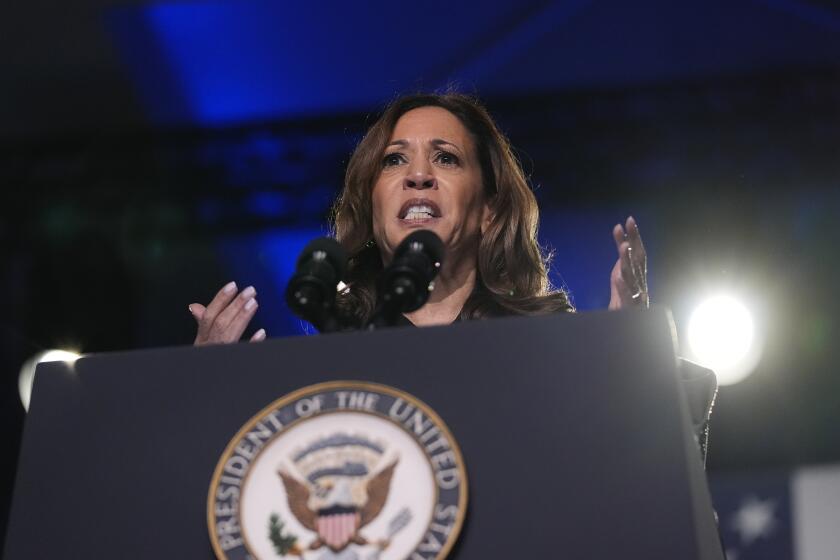Britain’s Iraqi Exiles Eager to Return Home
From the shops of Edgeware Road to a mosque in north London to a community center in Hammersmith, Iraqi exiles across this capital remember the moment when the statue of Saddam Hussein fell last month in Baghdad.
The exiles remember their tears and laughter, the festive phone calls and frantic channel-surfing to confirm their dream come true. And many recall the thought that raced through their minds with the strange speed of that statue tumbling down: Time to go home.
“Of course, all of us want to go back and see our families and have some kind of role in post-Saddam Iraq,” said Ahmed Shames, 28, leader of a pro-democracy group here.
“Our plan roughly now is to go to Iraq and make sure the process of democratization takes place, to make sure the transitional government remains transitional.
“We want there to be a representative government leading to a truly democratic Iraq,” he added. “Hopefully, I’ll be there in a matter of weeks.”
Though Shames is politically active, he has a day job working for the London subway system. Like the vast majority of the estimated 300,000 Iraqi immigrants and refugees in Britain, he is not part of the high-profile elite whose intrigues and aspirations have been backed by diplomats, politicians and intelligence agents in the United States, Britain, Iran and elsewhere.
Many “professional exiles” have already hurried to Iraq to stake out turf in the evolving political landscape.
Despite the euphoria in the exile community, most Iraqis here have strained to build new lives while holding on to hopes of a return. The reality is complicated: For social, cultural and economic reasons, many expatriates will find it difficult to move back to a homeland devastated by war and tyranny.
Zuhair Naher, a 40-year-old dentist, arrived with his family in Britain when he was 9. He has a practice, young children, commitments and entanglements in his adopted homeland. An energetic member of the Shiite party Al Dawa, he wants to contribute to transforming Iraq into an Islamic state along the democratic lines of Turkey or Lebanon. But he does not intend to move overnight.
“For those who have spent a short time here, it is easier,” Naher said. “For those with businesses, kids in school, it’s different. But they want to help out as much as they can.
“There is a huge role for exiles to play with expertise, financial and moral support. Many people here have been supporting extended families there,” he said.
Whether they plan a visit or a one-way trip, however, a variety of Iraqi Britons are packing bags and applying for visas these days. They include students and grandfathers, recently arrived rustics and dapper second-generation activists. They want to lend a hand in the reconstruction of a society that needs all the energy and skills the displaced have to offer.
“I see my big role as helping people in Iraq as a doctor,” said Abtenale Hussaini, 21, who was born after her family fled that nation, which she has never seen.
“I want to go back very soon, just to go and visit and see what I can do. But then I want to move back and start working as a doctor.”
Hussaini, a fourth-year medical student, wears a Muslim scarf with a stylish coat-and-slacks outfit. She belongs to Iraqi Prospect, an activist group of students and professionals in their 20s and 30s led by Shames.
Both attend the Dar al-Islam Foundation’s Iraqi Shiite mosque in north London. The mosque’s conservative elders want Islam to have a central place in Iraq’s political future and view the allied military forces there as a necessary evil.
The imam of the mosque, who has since departed for Baghdad, said in his sermon April 18 that the soldiers should stay until the country is stable -- but no longer.
“The presence of the coalition forces is a reality in Iraq, but it cannot remain,” imam Hussein Baraka told an overflow crowd at the first Friday prayers after the regime’s collapse.
“Iraq has nothing. No water, electricity, security. Of course we are against the coalition. But we want security, to establish ourselves first, and then we will call for the departure of the coalition.”
The mood is somewhat different among Westernized students and professionals. Hussaini and Shames shrug off the criticism and anti-American grumbling of older exiles, other Arabs and most Europeans their age. Instead, the activists cheer President Bush and British Prime Minister Tony Blair and call the war a success.
“I think this is probably one of the cleanest wars in history,” Shames said.
“You remember before the war they were saying half a million casualties? We kept saying these are exaggerations, worst-case scenarios,” he said. “These figures were used by the antiwar movement to support their case. And we kept saying this is not going to happen because the Iraqi people are not going to resist the coalition forces. And people were actually pretty friendly to them.”
The civilian casualties of the war, Shames said, pale in comparison with the massacres of Iraqis by Hussein’s regime. Shames and Hussaini were saddened by the reaction in London and the Mideast among many non-Iraqi Arabs, who, they said, demonized the allies and seemed disappointed that Hussein did not put up a bloodier fight.
“Some Arabs saw him as a symbol, as an idol,” Hussaini said. “So it’s great. Your symbol ran away. I hope that this will create democratic changes in the Arab world. Every Arab leader felt a shiver when they saw what happened to Saddam.”
Hasem Ali, 52, also has encountered flak from fellow Arabs.
Ali, a counselor at the Iraqi Community Center in London’s Hammersmith district, went shopping at his local Syrian-owned grocery a few days after the defeat of the regime. He was in high spirits, but he became embroiled in an argument with the owner and two customers, an Algerian and an Egyptian. They told him the Americans would turn Iraq into a puppet state.
“They said the Americans are going to write your textbooks, dictate what your people study,” Ali said. “I told them the Iraqi people are happy and you act like you are in mourning. It was uncomfortable. I had to flee the shop.”
Ali’s jubilation is shaded by fear and concern, however. He came to London a decade ago after Hussein’s troops suppressed an uprising that followed the 1991 Persian Gulf War. Ali and many other Iraqis have not forgotten what they consider a betrayal by former President Bush, whose administration encouraged their revolt but did not step in to finish off Hussein.
Today, Ali said, the allies’ failure to capture the Iraqi leader keeps resentment and conspiracy theories alive.
Ali’s community center, which provides social services to refugees and immigrants, has worked to put worried clients in touch with loved ones marooned in the war zone, much of which is still without telephones and other basic services. Yet like many of his clients, Ali refused to enter his personal information on a Red Cross Web site intended to help communication between exiles and relatives in Iraq. The site is open to all viewers, Ali said, and police-state paranoia dies hard.
“People are still worried that the genie can come back,” he said. “He came back 12 years ago. They won’t trust the occupiers that easily.”
For Ali, trust will come with tangible proof of Hussein’s physical and political demise. “I am waiting until I see DNA evidence that the regime is gone,” he said.
Ali’s activism has cost him years of hardship. An electrical engineer by trade, he has always lived and breathed politics. He lost a brother to Hussein’s secret police, one of the hundreds of thousands of countrymen to die in their youth -- “the age of the flowers,” as Ali calls it -- because of wars or political violence.
Politics took precedence over family life. Ali did not get married until after arriving in London. Now he wants to go back to Baghdad, at least for a while.
Ali has been talking to other exiled engineers, who calculate that there are thousands of their colleagues among the estimated 4 million Iraqi expatriates around the world. Beyond practical skills, they have Western ideas to share.
“People outside Iraq have lived in democratic societies,” he said. “ ... They have learned to be accepting of other opinions, to coexist with Jews, Americans, British. We wish we can transfer this experience. Because I don’t think building a real democracy will be an easy process.”
But on one point, Ali’s nationalism remains as fierce as if he never set foot outside Iraq. He doesn’t want to hear any more erroneous descriptions of the day U.S. troops took over his hometown.
“It wasn’t the fall of Baghdad,” Ali declared. He smiled, tears welling in his eyes -- just like when Hussein’s statue bit the dust. “It was the rise of Baghdad.”
More to Read
Sign up for Essential California
The most important California stories and recommendations in your inbox every morning.
You may occasionally receive promotional content from the Los Angeles Times.










